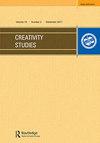新冠肺炎疫情期间小学生远程教育自主学习和创新思维能力的研究
Q1 Social Sciences
引用次数: 0
摘要
本研究旨在了解新冠肺炎疫情期间远程教育中学生自主学习与创造性思维能力之间的关系。小学生需要自律学习和创造性思维能力。他们在学习过程中训练学生的认知发展,并为下一个教育水平做好准备。教师应引导、鼓励和实施适当的学习策略,以提高学生的自主学习和创造性思维能力。它采用了一种量化方法,包括事后调查和调查方法。样本为121名小学生,随机抽取于印度尼西亚Sleman Regency。使用Likert量表问卷收集数据。结果表明,学生的自主学习水平处于中等水平,频率最高。创造性思维能力也达到了相同的水平和频率。此外,自主学习与创造性思维技能的相关系数较高(R=0.856)。因此,建议教师采用能够激活和发展自主学习的学习方法来提高学生的创造性思维技能。本文章由计算机程序翻译,如有差异,请以英文原文为准。
SELF-REGULATED LEARNING AND CREATIVE THINKING SKILLS OF ELEMENTARY SCHOOL STUDENTS IN THE DISTANCE EDUCATION DURING THE COVID-19 PANDEMIC
The research aimed to know the relation between self-regulated learning and creative thinking skills of elementary school students in the distance education during COVID-19 pandemic. Self-regulated learning and creative thinking skills are needed by elementary school students. They train the students’ cognitive development during the learning process and prepare them for the next educational level. Teachers should guide, encourage, and implement appropriate learning strategies to improve the students’ self-regulated learning and creative thinking skills. It employed a quantitative approach with ex post facto and survey methods. The sample was 121 elementary school students taken randomly in Sleman Regency, Indonesia. The data were collected using a Likert scale questionnaire. The results showed that the students’ self-regulated learning level was in the moderate category, which was the highest frequency. The creative thinking skills also reached the same level and frequency. Further, self-regulated learning and creative thinking skills were correlated with a high correlation coefficient rate (R = 0.856). Therefore, it is recommended that teachers use a learning method that can activate and develop the self-regulated learning to increase the students’ creative thinking skills.
求助全文
通过发布文献求助,成功后即可免费获取论文全文。
去求助
来源期刊

Creativity Studies
Social Sciences-Cultural Studies
CiteScore
3.20
自引率
0.00%
发文量
38
审稿时长
15 weeks
期刊介绍:
Creativity Studies accepts original research articles with a focus on communication within the creative society. The journal welcomes contributions from scholars from diverse disciplines such as philosophy, sociology, history, political, communication and information sciences. Creativity Studies also publishes survey papers and descriptions of academic events in this area. The journal issues will be organized around different issues on creativity.
 求助内容:
求助内容: 应助结果提醒方式:
应助结果提醒方式:


